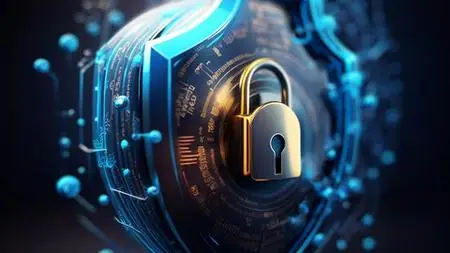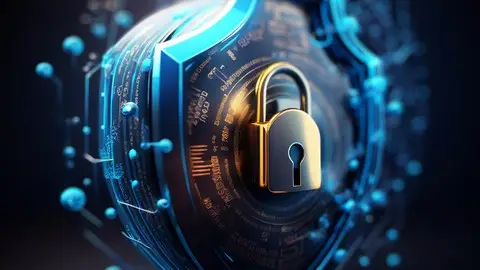Ultimate Cybersecurity: Uncovering Hacker Strategies
Published 6/2023
MP4 | Video: h264, 1280x720 | Audio: AAC, 44.1 KHz
Language: English | Size: 3.20 GB | Duration: 3h 27m
Published 6/2023
MP4 | Video: h264, 1280x720 | Audio: AAC, 44.1 KHz
Language: English | Size: 3.20 GB | Duration: 3h 27m
Mastering Defense: Learn Fundamentals, Hacker Tactics, Security Best Practices, and Legal Frameworks in Cybersecurity
What you'll learn
Understanding Cybersecurity Fundamentals: Students will gain a strong foundation in the core principles of cybersecurity.
Exploring Hacker Mindset and Techniques: This course will delve into the psychology of hackers, their motivations, and common tactics.
Uncovering Vulnerabilities and Threat Modeling: Students will learn how to identify vulnerabilities in a system and understand how these can be exploited.
Implementing Security Measures and Protocols: Students will be taught how to design, implement, and maintain effective security measures and protocols.
Incident Response and Disaster Recovery Planning: In this section, students will learn how to respond effectively to a security incident.
Requirements
Basic Computer Skills - Students should have a fundamental understanding of how to operate a computer, navigate the internet, and manage files and directories.
Familiarity with Operating Systems - Having some familiarity with various operating systems such as Windows, MacOS, and Linux is beneficial. Many cybersecurity tasks require an understanding of the underlying OS.
Understanding of Networking Concepts - Knowledge of basic networking concepts such as TCP/IP, DNS, HTTP/HTTPS, firewalls, and routers will be helpful.
General Knowledge of Programming - While not mandatory, having a general understanding of programming concepts can be very useful.
Ethical Mindset - An ethical mindset is critical when studying cybersecurity. Students must understand the importance of using their skills responsibly and within the bounds of the law.
Interest in Continuous Learning - A willingness and interest in keeping up-to-date with the latest developments in the field is a crucial prerequisite.
Description
In the course "Ultimate Cybersecurity: Uncovering Hacker Strategies," you will embark on a comprehensive exploration of the rapidly evolving world of cybersecurity. This course is designed to arm you with a deep understanding of the critical aspects of cybersecurity, whether you're an aspiring professional, an IT specialist, or an entrepreneur safeguarding your business.The course begins by grounding you in the fundamentals of cybersecurity, ensuring you have a solid foundation on which to build your knowledge. From there, you'll delve into the mind of a hacker, learning about common strategies and tactics used in cyber attacks.But understanding the threat is just the start. You'll discover best practices in cybersecurity, learning how to implement effective security measures and protocols to protect your digital assets. You'll also delve into the crucial area of incident response and recovery, gaining knowledge on how to limit damage, recover lost data, and prevent future attacks.A crucial aspect of modern cybersecurity is navigating the complex landscape of laws, regulations, and compliance. This course will guide you through this often complex area, helping you understand the legal and ethical implications of cybersecurity.Finally, you'll get hands-on with cybersecurity tools and resources, equipping you with practical skills and experience to tackle real-world cybersecurity challenges. The course concludes with a wealth of supplementary materials for you to explore and continue your learning journey.Whether you're just starting out in the field of cybersecurity, or looking to upgrade your existing skills, this course provides a comprehensive, engaging, and practical exploration of the world of cybersecurity. Join us as we uncover hacker strategies and master the art of digital defense.
Overview
Section 1: Introduction
Lecture 1 Introduction Video
Lecture 2 1.1. Course Overview
Lecture 3 1.2. Importance of Cybersecurity
Lecture 4 1.3. Course Objectives and Expectations
Section 2: Fundamentals of Cybersecurity
Lecture 5 Fundamentals of Cybersecurity Video
Lecture 6 2.1. Key Concepts and Terminologies
Lecture 7 2.2. Understanding Threats, Vulnerabilities, and Risks
Lecture 8 2.3. The CIA Triad: Confidentiality, Integrity, Availability
Section 3: Common Hacker Strategies
Lecture 9 Common Hacker Strategies Video
Lecture 10 3.1. Social Engineering Attacks
Lecture 11 3.1.1. Phishing
Lecture 12 3.1.2. Pretexting
Lecture 13 3.1.3. Baiting
Lecture 14 3.2. Malware Attacks
Lecture 15 3.2.1. Viruses
Lecture 16 3.2.2. Worms
Lecture 17 3.2.3. Ransomware
Lecture 18 3.3. Network-based Attacks
Lecture 19 3.3.1. Man-in-the-Middle
Lecture 20 3.3.2. Denial of Service (DoS)
Lecture 21 3.3.3. Distributed Denial of Service (DDoS)
Lecture 22 3.4. Exploiting Vulnerabilities
Lecture 23 3.4.1. SQL Injection
Lecture 24 3.4.2. Cross-Site Scripting (XSS)
Lecture 25 3.4.3. Zero-Day Exploits
Section 4: Cybersecurity Best Practices
Lecture 26 Cybersecurity Best Practices Video
Lecture 27 4.1. Implementing Strong Password Policies
Lecture 28 4.2. Regular Software Updates and Patch Management
Lecture 29 4.3. Multi-Factor Authentication (MFA)
Lecture 30 4.4. Data Encryption and Secure Communication
Lecture 31 4.5. Network Security Measures
Lecture 32 4.5.1. Firewalls
Lecture 33 4.5.2. Intrusion Detection and Prevention Systems (IDPS)
Lecture 34 4.5.3. Virtual Private Networks (VPNs)
Section 5: Incident Response and Recovery
Lecture 35 Incident Response and Recovery Video
Lecture 36 5.1. Creating an Incident Response Plan
Lecture 37 5.2. Identifying and Analyzing Security Incidents
Lecture 38 5.3. Containment, Eradication, and Recovery
Lecture 39 5.4. Post-Incident Review and Lessons Learned
Section 6: Cybersecurity Laws, Regulations, and Compliance
Lecture 40 Cybersecurity Laws, Regulations, and Compliance Video
Lecture 41 6.1. Understanding Data Privacy Laws
Lecture 42 6.2. Compliance with Industry Standards
Lecture 43 6.2.1. GDPR
Lecture 44 6.2.2. HIPAA
Lecture 45 6.2.3. PCI DSS
Lecture 46 6.3. Cybersecurity Frameworks
Lecture 47 6.3.1. NIST
Lecture 48 6.3.2. ISO/IEC 27001
Section 7: Cybersecurity Tools and Resources
Lecture 49 Cybersecurity Tools and Resources Video
Lecture 50 7.1. Security Assessment and Testing Tools
Lecture 51 7.2. Open-Source Security Tools
Lecture 52 7.3. Monitoring and Logging Tools
Lecture 53 7.4. Essential Security Resources and Communities
Section 8: Conclusion
Lecture 54 Conclusion Video
Lecture 55 8.1. Course Summary
Lecture 56 8.2. Staying Informed and Up-to-Date
Lecture 57 8.3. Next Steps for Advancing Your Cybersecurity Knowledge
Section 9: Supplementary Materials
Lecture 58 Glossary of Cybersecurity Terms
Lecture 59 Security Incident Response Plan Template
Lecture 60 List of Recommended Cybersecurity Books and Online Resources
Lecture 61 Practical Exercises and Case Studies
Lecture 62 Assessment: Cybersecurity Quiz
Aspiring Cybersecurity Professionals: Individuals who are interested in pursuing a career in cybersecurity will find this course invaluable.,IT Professionals: IT professionals looking to expand their knowledge base and skill set can benefit from this course.,Entrepreneurs and Business Owners: Entrepreneurs and business owners who want to understand cybersecurity threats and how to protect their business assets online will find this course beneficial.,Students Studying Computer Science or Related Fields: This course is also suitable for students in computer science or related fields who wish to broaden their understanding of cybersecurity.



